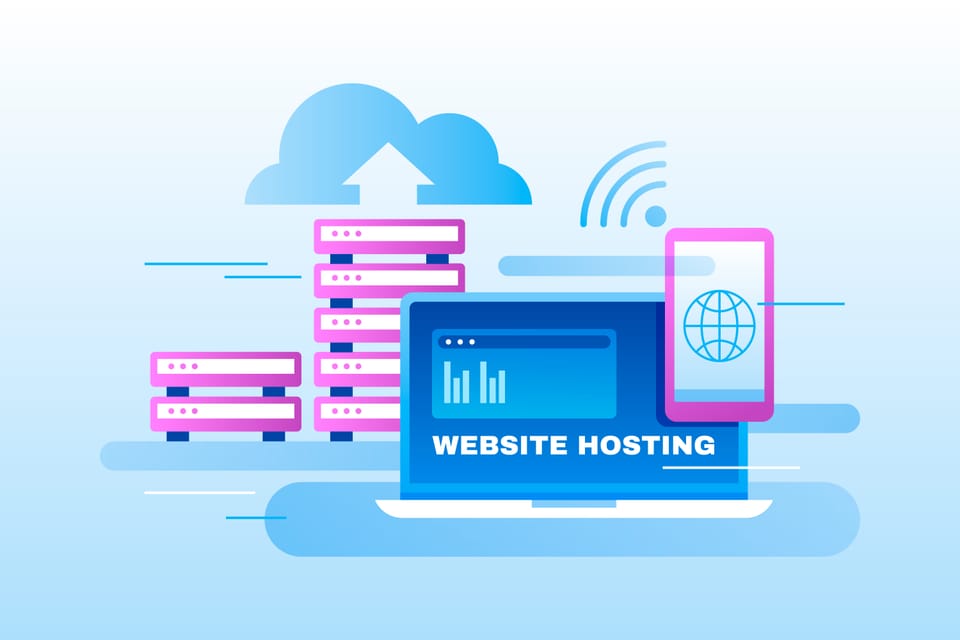Self-Hosting explained: Privacy, Decentralization & Independence

In the age of ubiquitous cloud services, social platforms, and tech monopolies, self-hosting stands out as an ethical and political act. While once considered a niche or technically intimidating practice, self-hosting (running your own web services such as websites, email, file storage, or DNS servers) has grown into a viable option for individuals and small teams who value privacy, autonomy, and control over their data.
Self-Hosting Defined
Self-hosting is the practice of hosting and managing software services (such as a website, email server, cloud storage, DNS resolver, etc.) on infrastructure that you control. This could be a VPS (virtual private server), a physical server in your home, or even a Raspberry Pi. You manage the setup, the software stack, the configurations, and the security updates.
This is in contrast to using managed services (e.g., Gmail, Dropbox, Squarespace) or cloud platforms (AWS, Google Cloud, Azure), where control over your data and infrastructure is significantly reduced.
Privacy: Taking Back Control of Your Data
The Problem with the Cloud
The default internet experience today is highly centralized. Most users depend on a handful of corporations (Google, Amazon, Meta, Microsoft, and Apple) for everything from communication to file storage to DNS resolution. This consolidation creates a massive privacy concern.
These platforms often operate on surveillance capitalism, profiting from collecting, analyzing, and monetizing user data. Your email metadata, file contents, browsing habits, and communication patterns become fuel for targeted advertising, machine learning training sets, and more.
How Self-Hosting Improves Privacy
When you self-host, you eliminate or reduce the number of third parties that have access to your data. You know exactly what’s running on your server. You can encrypt everything end-to-end. You can avoid unnecessary telemetry. You can choose software designed with privacy in mind, such as:
- Nextcloud for file storage and collaboration
- Poste.io or Mailcow for self-hosted email
- Pi-hole or Unbound for DNS-level ad/tracker blocking
- Matrix (Synapse) or XMPP for self-hosted messaging
Even when hosted on a VPS, you can encrypt at rest and in transit, monitor for anomalies, and choose providers with strong data protection policies. This is how Self-Hosting improves privacy and is different from traditional Hosting.
The Trade-Offs (Quick Pros & Cons of Self-Hosting)
- Self-hosting doesn’t automatically guarantee perfect privacy. If you don’t configure your systems properly, you may still leak data.
- VPS hosting still involves a third party (your hosting provider) so full privacy depends on trust and mitigation (e.g., using encryption, choosing privacy-focused providers, or hosting at home).
Still, it puts YOU in control, and not a megacorp.
What actually is Decentralization in the Internet/Online?
The internet was originally built to be decentralized—a network of networks, each independently managed but interoperable. Over the last two decades, however, we've seen extreme consolidation of services:
- DNS lookups overwhelmingly go through Google (8.8.8.8) or Cloudflare (1.1.1.1).
- Social discourse is channeled through a handful of platforms.
- Email is monopolized by Gmail and Microsoft.
- Website hosting, cloud computing, and storage are dominated by AWS, Azure, and Google Cloud.
This concentration introduces single points of failure, censorship potential, and vendor lock-in. It also leads to "infrastructure fragility", where outages in one provider (e.g., AWS going down) take down huge swaths of the web.
Self-Hosting as Decentralization in Practice
Every self-hosted service is a step toward a more resilient, robust, and diverse internet. When thousands of individuals and small communities run their own servers:
- DNS queries can be resolved independently.
- Communications aren't funneled through one provider.
- Data is distributed across independent nodes rather than centralized silos.
- New social protocols and federated platforms like Mastodon (ActivityPub) or Matrix gain traction.
Even if you’re only hosting a personal blog or a family photo server, you’re actively participating in the resistance to platform centralization.
Real-World Impact
- During politically sensitive events, governments often pressure centralized platforms to remove content. Self-hosted alternatives are harder to censor.
- Localized services can serve specific community needs, independent of the global internet’s whims.
- Decentralization fosters innovation and niche experimentation that’s impossible in the “scale or die” ethos of Silicon Valley.
Independence: Digital Sovereignty and Autonomy
Most users don’t realize how deeply dependent they are on a few companies. What happens if:
- Google suspends your account?
- Dropbox gets hacked?
- AWS pricing changes overnight?
- A SaaS provider you depend on shuts down?
You lose access, data, or services you depend on. Worse, you have little to no recourse.
Self-Hosting and Digital Sovereignty
Self-hosting shifts this power dynamic. You control:
- When to update or upgrade your system
- What data is stored, collected or transmitted
- Who gets access to your content or services
- How long your data exists
You are not subject to shifting terms of service, business decisions, or account suspensions.
Self-hosting is akin to digital homesteading—you own your land (server), build your house (services), and maintain your property. It requires work, but the autonomy it provides is unparalleled.
Ethical Dimensions of Sovereignty
- Independence is a cornerstone of digital rights. Control over your digital life is an extension of your civil liberties.
- Hosting your own infrastructure can be a lifeline for communities in surveillance states, censorship regimes, or crisis zones.
- The ethical stance is clear: users deserve control over their own data and tools.
The Barriers and Responsibilities of Self-Hosting
Self-Hosting Isn’t Free or Easy
It would be unethical to paint self-hosting as a universally accessible path. It comes with:
- Technical complexity: You need to understand networking, DNS, security, server administration, etc.
- Time investment: Maintenance, updates, backups, and troubleshooting can be demanding.
- Risk: A misconfigured server can become a security liability or go offline without notice.
The Ethical Obligation of the Self-Hoster
When you self-host, especially if others rely on your service (even your family), you take on responsibilities:
- Keep systems patched and secure
- Protect user data and privacy
- Avoid contributing to spam, malware distribution, or botnets through negligence
- Design for resilience (backups, monitoring, failovers)
Ethical self-hosting means not just doing it for yourself, but doing it right. Self-hosting is not just for hobbyists anymore. There’s a growing ecosystem of tools, guides, and communities making it more accessible.
Projects like Yunohost, Sandstorm, Umbrel, and CasaOS provide user-friendly interfaces and automated deployments, significantly lowering the technical barrier for newcomers. At the same time, federated platforms such as Mastodon, PeerTube, and Matrix have gained traction by offering decentralized alternatives to mainstream social media, video hosting, and messaging services.
What was once a deeply technical space is now being supported by a thriving network of communities and resources. From tutorials on Reddit and Hacker News to conversations across the Fediverse, a shared knowledge base is actively onboarding new users and helping them build resilient digital spaces. Even beyond individuals, cooperatives, community collectives, and small independent ISPs are adopting self-hosted or hybrid infrastructures, proving that the model can scale—and thrive—well beyond the individual user.
What will the future bring in regards to Self-Hosting
Now imagine an internet where data isn’t harvested or mined but is stored locally or within trusted circles. Instead of flowing through centralized corporate servers, communication moves across federated systems built and maintained by communities, not billionaires. Every website you visit is independently operated, shaped by the values and priorities of its owner, not driven by ad revenue or engagement metrics. And when a major cloud provider goes down, the rest of the web remains standing: resilient, distributed, and self-reliant.
This vision of the internet isn’t a utopian dream! It’s already unfolding, one self-hosted service at a time. The future of the internet doesn’t have to be one of consolidation and control. With self-hosting, we can reclaim our digital spaces and shape a web that reflects freedom, diversity, and community ownership. It’s a future worth building and self-hosting is a powerful step in that direction.
What we learned about Self-Hosting
Self-hosting is more than a technological preference; it's a moral and political choice. In a world of increasing surveillance, censorship, and dependency on tech giants, self-hosting represents:
- A commitment to privacy in a time of surveillance
- A push for decentralization in a centralized web
- An act of independence in a system that thrives on user lock-in
It’s not for everyone but the more people who embrace it, the better chance we have of building a healthier, freer, and more ethical internet.
If we want an internet that reflects human values rather than corporate interests, self-hosting is a crucial part of the path forward.
Why try MyNymBox private and anonymous Hosting Services?
While self-hosting offers significant advantages in terms of privacy, decentralization, and independence, it isn’t always the easiest or most practical solution for everyone. That’s where MyNymBox comes in. At MyNymBox, we provide a seamless, private, and anonymous hosting experience tailored to individuals and organizations who care about their data. Our hosting services prioritize full transparency, security, and privacy, ensuring that your digital sovereignty is maintained without the technical hassle of managing your own infrastructure.




